Ex-FM Zarif Justifies Iran's Proxy Support Amid Worst Tensions In Years
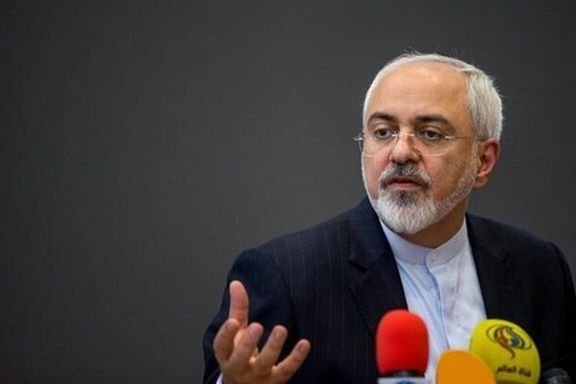
The former Iranian foreign minister has voiced support for the country’s regional proxies amidst the worst tensions in decades.

The former Iranian foreign minister has voiced support for the country’s regional proxies amidst the worst tensions in decades.
Speaking to hardline Tehran-based newspaper Vatan-e Emrooz, Mohammad Javad Zarif underscored Iran's “genuine support” for such militant groups in the region, dubbed the "Axis of Resistance", a brainchild of Iran’s Supreme Leader.
Since October, Iran and its regional allies have intensified their activities against Israel and the US, coinciding with Israel's military campaign in Gaza following Hamas' surprise attack on Israel which killed 1200.
For the past nearly four months, militias supported by Iran in Iraq and Syria have been directing attacks on US bases,
Hezbollah in Lebanon has been firing missiles towards northern Israel, and Houthi rebels in Yemen have been targeting commercial ships in the Red Sea.
They cite Israel's military campaign in Gaza as justification for their actions and advocate for a ceasefire.
Zarif’s statement follows the recent killing of three American soldiers in an attack by militant forces along the Jordan-Syria border. In response, the President of the United States has declared intentions to retaliate against such assaults.
Iranian officials claim these forces act “independently” and do not receive direct orders from Iran while Zarif claimed “the Islamic Republic can play an important role in supporting the resistance."
Zarif, who served as Iran's Foreign Minister for eight years under President Hassan Rouhani, faced sanctions from the Trump administration under an executive order targeting key figures associated with the Iranian leadership.
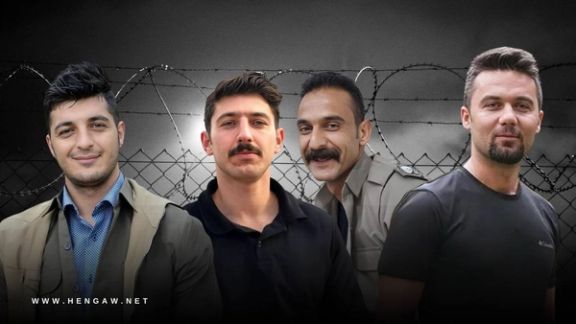
An Iranian lawmaker says the execution of four Kurdish prisoners, who were hanged in Iran on Monday is a lesson to anyone who wants to overthrow the regime.
“These executions are a lesson for anyone who wants to stand against the will of the Iranian nation because the Iranian nation will punish them for their deeds,” Mehdi Sa’adati, a member of the parliament’s National Security and Foreign Policy Committee told the semi-official Iranian Students News Agency (ISNA) Monday.
Iran’s parliament is controlled by hardliners, many of whom come from the ranks of the Revolutionary Guards, and have fully supported security and intelligence agencies in their crackdown on dissent.
The four prisoners -- Pejman Fatehi, Mohsen Mazloum, Mohammad (Hazhir) Faramarzi and Wafa Azarbar – who were hanged at Ghezel Hesar Prison in Karaj, near Tehran, were accused of planning to blow up a defense ministry facility in Najafabad, Esfahan Province in July 2022. They were accused of being Israeli agents.
“Cooperation with Mossad has no outcome other than being executed. This is the Iranian nation’s demand,” he added.
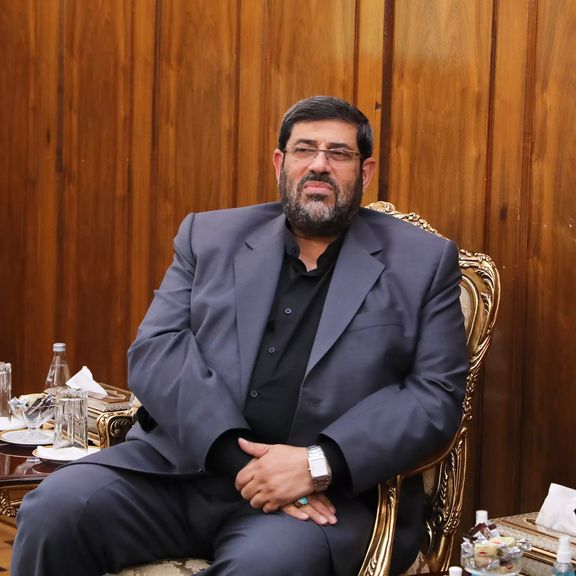
Iranian authorities claim that the four young men were apprehended in a village in Iran’s West Azarbaijan Province, just days before they were set to execute their planned operation. They further allege that these individuals received training from Israel's Mossad in three African countries, including Tanzania, where they practiced using similar structures as target simulations.
The prisoners, who belonged to the Kurdish Komala party, were allegedly forced into making false self-incriminating confessions, which the state television (IRIB) aired in October 2022, and were tried behind closed doors without due process.
Their lawyer, Masoud Shamsnejad, has said that he was not allowed to see the case files and the Supreme Court turned down his request for a retrial for lack of submission of court documents.
The executions have enraged many Iranians, particularly those in Kurdish areas, where they went on a general strike on Tuesday. Seven Kurdish human rights organizations including Hengaw Organization for Human Rights, as well the Komala Party of Iranian Kurdistan called for the general strike in the Kurdish areas of Iran in protest to the executions and to draw the attention of the international community to the worrying human rights situation in Iran's Kurdish areas.
“I assure that Kurdistan will not remain silent in the face of the killing of its children,” Abdullah Mohtadi, secretary general of the Komala Party, tweeted Monday.
Rights organizations have also warned that Iran’s Supreme Court has confirmed the death sentence passed on six other Kurdish prisoners who will be in imminent danger of execution.
Iran International has received reports about total or partial internet disruptions in some areas of Iran's Kordestan Province.
Amnesty International said in a tweet on Monday that it was horrified by the arbitrary execution of the four Kurdish dissidents “after a grossly unfair secret trial”.
“Their execution comes amid an alarming spike in executions by Iran's authorities, including as tool of political repression against protesters, dissidents & oppressed ethnic minorities, particularly Kurds & Baluchis, who are disproportionately targeted by the death penalty,” Amnesty said while urging the international community to condemn the Islamic Republic’s “killing spree and intensified use of the death penalty as a tool of repression.”
Rights organizations and activists have called on Nada Al-Nashif, the UN Deputy High Commissioner for Human Rights, to cancel her visit to Tehran from 2 to 5 February to investigate executions and women's rights violations in protest to the regime’s executions.
“The timing of this visit, the context in which it would take place and its modalities raise very serious concerns. We respectfully urge you to hear these concerns and to reconsider the opportunity, timing and modalities of this visit,” Article 19, an international human rights organization, said in an open letter addressed to UN High Commissioner for Human Rights Volker Türk and Al-Nashif.

An IRGC-affiliated news website has dismissed allegations that the classic Bugatti car once owned by Iran's former Shah has been sold to address budget shortfalls.
Fars News Agency stated that in 1959, the car in question was sold to an individual named Houshang Jalili and subsequently taken out of the country.
"The car, bearing its Persian plate, was later sold to an American collector in the 1960s and has since been part of the collection at the Petersen Museum in California. It has never been among the assets of Sa’adabad Palace since the Islamic Revolution," Fars News added.
The agency wrote that the car, currently on display at the Petersen Museum in America, was originally gifted by the French government in 1939 to mark the marriage of Mohammad Reza Pahlavi to Egyptian princess Fawzia Fuad.
This isn't the first instance of reports circulating about the sale of this prestigious car. In 2020, Kia Parsa, the director of the Sa’adabad Cultural-Historical Complex, refuted similar social media reports regarding the sale of a 57C Bugatti, once owned by Mohammad Reza Pahlavi, following the 1979 Islamic Revolution.
Iran is facing a significant infrastructure deficit estimated at $500 billion. While many commentators and regime politicians in Iran often attribute economic challenges to President Ebrahim Raisi's administration, broader factors including foreign policy decisions, particularly under Supreme Leader Ali Khamenei, play a significant role. Sanctions from the US and Europe, coupled with limited foreign investments, have intensified Iran's reliance on dwindling oil exports.
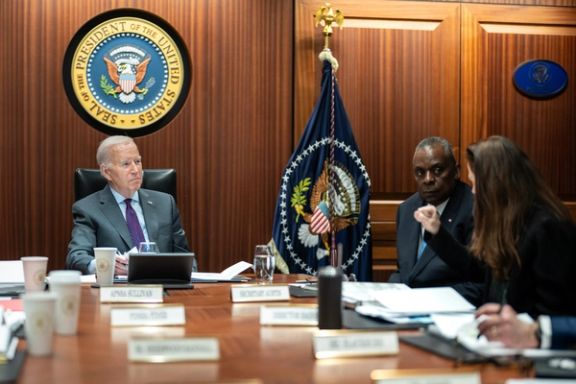
The Biden administration on Monday grappled with the idea of retaliation against Iran and its proxies without escalation of the conflict in the Middle East.
Unconfirmed reports suggested that President Biden would authorize military action in the Middle East early Tuesday local time. But no US strikes were recorded, further angering those in Washington who have been calling on Biden to ‘toughen up’ on Iran for many months –and who believe loss of American life must be avenged.
That is something the administration has promised, of course.
“The president and I will not tolerate attacks on US forces and we will take all necessary actions to defend the US and our troops,” Secretary of Defense Lloyd Austin said Monday, reiterating that “all necessary actions” will be taken.
But “necessary actions” often come with consequences. And it’s those potential consequences, it seems, that the Biden administration finds unpalatable.
“We want to avoid broader escalation,” Secretary of State Antony Blinken said, betraying the prevailing perception within the US government that a substantive attack against Iran would lead to a full-scale war in a region that’s “incredibly volatile” already.
“I would argue that we’ve not seen a situation as dangerous as the one we’re facing now across the region at least since 1973, and arguably even before that,” Blinken said, warning at the same time that the US will respond “strongly” to anyone who attempts to use the crisis to attack American personnel.
Observers noted that just last September, National Security Adviser Jake Sullivan had said that the Middle Eat is "quieter today than it's been in two decades," highlighting what they believe is the administration's lack of a coherent Middle East policy.
For critics, Iran seems to be impervious to warnings from the Biden administration for that reason. After all, the original warning, “don’t, don’t, don’t” was never backed up by action. And later statements, such as “the message has been delivered to Iran” with the airstrikes against Houthis in Yemen turned out to be more of an expression of wish than a pronouncement of fact.
Still, many experts believe that a consequential strike is inevitable this time.
With all his worries about regional “peace and stability”, with all his aversion to an oil price hike that would hit American consumers, President Biden may find it all but impossible to enter a presidential race am image of weakness in foreign policy.
Biden’s potential rival in the 2024 elections Nikkie Haley lambasted the incumbent in a Fox News interview Monday, calling for “hitting Iran smart” and “taking away their capabilities” so that no more American soldiers are hurt.
“Joe Biden has been appeasing Iran for too long,” Haley posted on X. “Dictators and thugs only respond to strength.”
More than 40 US troops have been injured in last weekend’s attack, including five with traumatic brain injury. Since October, at least 160 attacks have been recorded against American soldiers in Iraq and Syria since October. Less than ten percent of those attacks have been reciprocated. And it’s precisely due to this imbalance in aggression, Biden critics say, that three soldiers have lost their lives.
“Real leadership requires real action,” said Rep. Mike Rogers, chair of the House Armed Services Committee, in a statement. “Attacks on our servicemembers, allies, and interests will continue until this president shows strong leadership and strikes fear in our enemies.”
President Biden has vowed a strong response to the attacks that he has laid at the door of the regime in Iran. The response, according to secretary Blinken, “could be multi-levelled, come in stages, and be sustained over time.”
Experts have predicted –or suggested– a range of possible retaliatory actions: from Soleimani-style killing of military men to cyber attacks on IRGC command and control, from CIA operations to airstrikes against Iran’s navy or even oil production facilities inside Iran.
Having sensed the danger, perhaps, Iranian officials have disowned last weekend’s attack on the US base in Jordan, claiming that the array of armed groups that the Islamic Republic funds, trains, equips, and calls “Resistance”, act independently and based on their specific agendas and contingencies.
According to ‘hit Iran’ advocates, these groups cannot function –or will drastically diminish– without Iran’s support. And Iran would withdraw its support only if it’s forced to, the argument goes.

Babak Negahdari, the head of the Research Center of the Iranian Parliament, has issued alarming statements regarding Iran's climate crisis.
Negahdari revealed that over the last half-century, rainfall in the nation has decreased by 50 millimeters. Furthermore, he disclosed that “61.7 percent of Iran's land is currently grappling with drought.”
Addressing delegates at the seventh International Climate Change Conference in Tehran, Negahdari emphasized on Monday the comprehensive impact of climate change, stressing that it permeates across various sectors.
“The serious consequences of climate change affect issues such as food security, ecosystems, energy security, and more.”
Negahdari also underscored a trend of rising temperatures. He warned that if unchecked, climate change could precipitate a staggering $23 trillion economic decline by 2050.
The severity of the ongoing drought crisis was earlier highlighted by the CEO of the Water and Wastewater Engineering Company, Hashem Amini, who disclosed a significant decline in Iran's renewable water resources. From approximately 130 billion cubic meters a decade ago, the resources have dwindled to around 100 billion cubic meters.
Amini cautioned that dwindling surface water reserves are increasing reliance on underground water sources, exacerbating issues such as land subsidence.
Reports indicate that the Iranian government has been less than transparent about the extent of the land subsidence crisis related to decreasing levels of underground water, with documents suggesting deliberate concealment of information.
Official statements confirm that 49 percent of Iran's population, equivalent to 39 million individuals, are at risk due to land subsidence. Notably, Tehran and Khorasan Razavi provinces face heightened vulnerability, with the situation particularly dire in the metropolitan area of Esfahan.
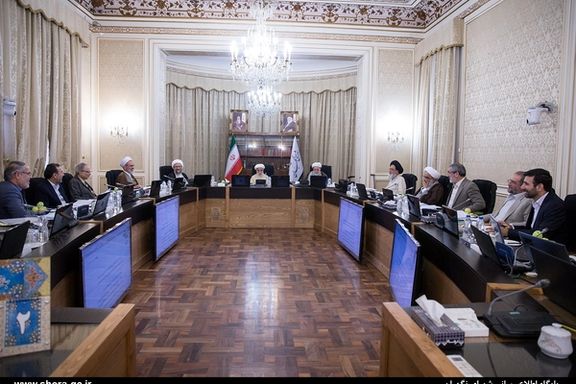
Critics argue that barring certain candidates from the Assembly of Experts elections, is an attempt to safeguard leadership plans in the event of Ali Khamenei’s death.
The Guardian Council, with powers to vet candidates, announced the results for the upcoming elections on March 1. The Assembly of Experts is the constitutionally designated body to select the future Supreme Leader, as it once did in 1989, when Ali Khamenei was chosen after the death of Ruhollah Khomeini.
The Guardian Council announced its results, disqualifying former President Hassan Rouhani, a member since 2000, and Ayatollah Ahmad Parvaei, a member since 2016. Parvaei expressed his intention to comply fully with the law and hopes the Council will reconsider its decision. Meanwhile, Rouhani demands the Council publicly state the reasons for his disqualification.
Lawmaker Javad Karimi-Ghodousi (Qoddusi) suggested in a tweet before the official announcement that Rouhani's potential to influence the choice of the future leader was a key factor in his disqualification. This suggestion drew parallels with the historical meeting at Saqifah in Medina in 632 CE, where the appointment of Abu Bakr as the leader of the Muslim community was contentious.
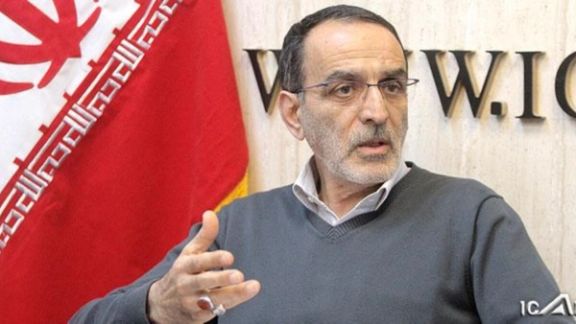
Abu Bakr’s appointment as the leader of the Muslim community, despite the insistence of the Prophet’s relatives and some of his companions who believed the Prophet had appointed his cousin and son-in-law, Ali ibn Abi Talib, as his successor marked the beginning of the division with those in favor of the meeting’s decision being labeled Sunnis and supporters of Ali’s right to caliphate as Shia.
According to the reformist Ham-Mihan newspaper, Rouhani's disqualification, rather than being solely based on legal reasons and candidates' past history, revolves around the anticipated expediency of future events.
This is not the first time such a rationale has been employed by the Guardian Council, Ham-Mihan pointed out. In 2013, it barred the veteran politician Akbar Hashemi-Rafsanjani from running in the presidential elections, citing similar considerations.
The Guardian Council, originally empowered to interpret the Constitution, review legislation, and supervise elections, bestowed upon itself discretionary supervisory powers in 1991, giving it the final say on candidate eligibility. Over the past two decades, it has used these powers to eliminate various political factions, targeting reformists, moderates, and even some conservatives.
Some prominent former officials previously disqualified from running in elections include Mahmoud Ahmadinejad and conservative parliament speaker Ali Larijani, ostensibly due to concerns about their loyalty to Khamenei.
The Council, however, has always cited other reasons for disqualifying candidates or argued that it could not confirm the candidate’s qualifications due to lack of sufficient evidence. Religious jurisprudence (ijtihad), required for running in elections of the Assembly of Experts, for instance, has often been cited for disqualification of candidates in its elections.
The Guardian Council comprises twelve members, half of whom are clerics with expertise in Sharia laws appointed by the supreme leader. The remaining six members, who may be laymen or clerics versed in civil law, are appointees of the chief justice. They require parliamentary approval for their appointments but cannot vote on matters related to Sharia.
Disputes between the Council and Parliament over legislation are referred to the Expediency Council, whose members are also appointed by the supreme leader. The Guardian Council has a history of rejecting legislative reforms related to elections, women's rights, and international human rights conventions.
This ongoing pattern of candidate disqualification has raised concerns about the transparency and fairness of Iran's electoral process.